

Frightful Film Trailer - A Tale Unfolds. Can Schools Cultivate a Student’s Ability to Think Differently? Entrepreneurship is often associated with people who assume the risk of starting a business venture for financial gain.
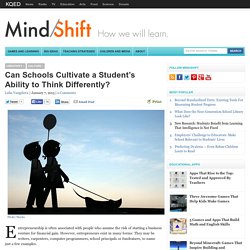
However, entrepreneurs exist in many forms: They may be writers, carpenters, computer programmers, school principals or fundraisers, to name just a few examples. What they have in common is an “entrepreneurial mindset” that enables them to see opportunities for improvement, take initiative and collaborate with others to turn their ideas into action.
Everyone is born with some propensity for entrepreneurship, which at its core is about solving problems creatively, according to Yong Zhao, a professor at the University of Oregon’s College of Education. He is the author of several books, including, most recently, “Who’s Afraid of the Big Bad Dragon? Why China has the Best (and Worst) Education System in the World.” “Students are treated like employees of a big company, who don’t bear the risk if the company fails,” he says. The Path From Here to There Related. American Schools Are Training Kids for a World That Doesn't Exist. Are Americans getting dumber?
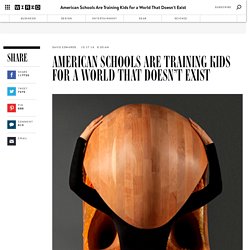
Our math skills are falling. Our reading skills are weakening. Our children have become less literate than children in many developed countries. But the crisis in American education may be more than a matter of sliding rankings on world educational performance scales. Our kids learn within a system of education devised for a world that increasingly does not exist. To become a chef, a lawyer, a philosopher or an engineer, has always been a matter of learning what these professionals do, how and why they do it, and some set of general facts that more or less describe our societies and our selves. We “learn,” and after this we “do.”
This approach does not map very well to personal and professional success in America today. Over the next twenty years the earth is predicted to add another two billion people. David Edwards About David Edwards is a professor at Harvard University and the founder of Le Laboratoire. How 21st Century Learning Fits Into The Common Core. At a time when many teachers and parents (and students!)
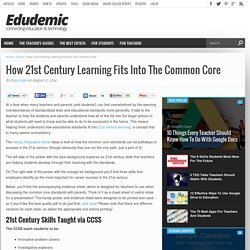
Can feel overwhelmed by the seeming overabundance of standardized tests and educational standards more generally, it falls to the teacher to help the students and parents understand how all of this fits into the larger picture of what students will need to know and be able to do to be successful in the future. This means helping them understand how educational standards fit into 21st century learning, a concept that to many seems contradictory. The handy infographic below takes a look at how the common core standards can be pathways to success in the 21st century (though obviously they are not the only path, just a part of it).
The left side of the poster with the blue background explores six 21st century skills that teachers are helping students develop through their teaching with the standards. 21st Century Skills Taught via CCSS The CCSS teach students to be: Critical Thinking. Shift Happens. Teaching In The 21st Century. Engauge21st.pdf. Futures Thinking. Decision-making in education often focuses on the short-term, looking to make established practices more efficient.
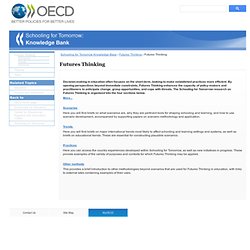
By opening perspectives beyond immediate constraints, Futures Thinking enhances the capacity of policy-makers and practitioners to anticipate change, grasp opportunities, and cope with threats. The Schooling for Tomorrow research on Futures Thinking is organised into the four sections below. More... Scenarios Here you will find briefs on what scenarios are, why they are pertinent tools for shaping schooling and learning, and how to use scenario development, accompanied by supporting papers on scenario methodology and application. Trends Here you will find briefs on major international trends most likely to affect schooling and learning settings and systems, as well as briefs on educational trends. Practices Here you can access the country experiences developed within Schooling for Tomorrow, as well as new initiatives in progress. Other methods. Supporting future-oriented learning and teaching - a New Zealand perspective. Executive Summary It is widely argued that current educational systems, structures and practices are not sufficient to address and support learning needs for all students in the 21st century.
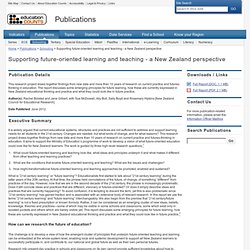
Changes are needed, but what kinds of change, and for what reasons? This research project draws together findings from new data and more than 10 years of research on current practice and futures-thinking in education. It aims to support the Ministry of Education’s programme of work to develop a vision of what future-oriented education could look like for New Zealand learners. The work is guided by three high-level research questions:1. Elizabeth Vale School - Department of Education and Children's Services. Silverton Primary School - Homepage.